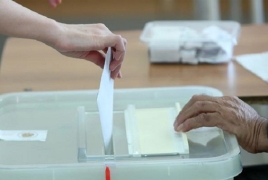
National Assembly Speaker Alen Simonyan said during a press briefing that current surveys show the ruling Civil Contract party remains the leading political force with the strongest public support in Armenia.
"I'm confident that if elections are held this Friday in Armenia, Civil Contract will win with 50+1%, and by 2026, the percentage may be even higher," he said, as reported by Pastinfo.
In response to the question of why Civil Contract lost in Gyumri, Simonyan urged against comparing local and national elections, saying they are not equivalent benchmarks.
He further claimed that Armenia is under hybrid warfare pressure, especially through mechanisms implemented by Russia, Aysor.am reports.
He said that, based on his assessment, substantial financial resources are being allocated from various directions, including the Russian Federation, to destabilize Armenia.
"I understand that large sums of money are being spent from different sources, notably by our northern neighbor, Russia. This hybrid war flares up, for instance, when commentators—some with distant Armenian surnames—appear on Russian TV trying to trigger regime change in Armenia and announce rallies. Let me warn you: this will intensify in 2026. And I’m not afraid to say this out loud—it will backfire and double what you call the government’s X rating," he stated.
Asked whether there is a threat of a coup, Simonyan assured that he sees no such danger, basing his stance on personal experience.
"I don’t see a coup threat from anyone because I trust the people of Armenia. Since the 2020 war, changing the government has been a major objective for different factions and poles," he added.
On why the Prime Minister is viewed as undesirable by some Russian circles, Simonyan said the information they receive from their partners contradicts this claim.
"Our partners tell us the opposite," he noted.
As for why talk of regime change persists, Simonyan linked it to democratic processes in post-Soviet countries.
"It’s a bad example—having an elected government in the post-Soviet space. Such precedents are rare, and that’s considered a negative model. Secondly, Armenia is making clear steps to strengthen its statehood and independence due to historical developments, which obviously doesn’t please everyone. Because Armenia, it seems, must always depend on some center, always have a big brother, and assume that if there’s no superpower, it will be devoured," he concluded.

